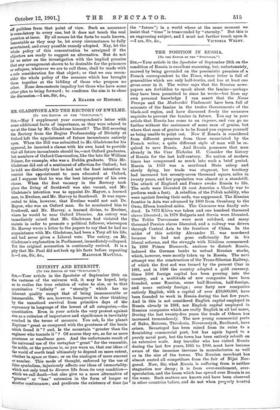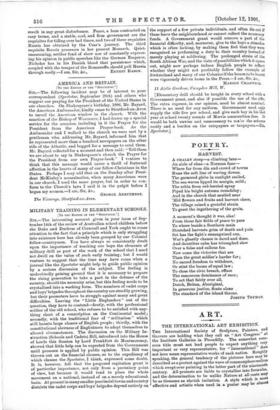THE POSITION IN RUSSIA.
[To THE EDITOR OP THE " SPECTATOR...1
Sxa,—Your article in the Spectator of September 28th on the condition of Russia is excellent reasoning, but, unfortunately, marred by being grounded on the pessimistic premises of a French correspondent to the Times, whose letter is full of generalities which are only half-truths, and has at least one gross error in it. The writer says that the Russian news- papers are forbidden to speak about the famine—perhaps they have been permitted to since he wrote—but from my own personal knowledge I can assert that the Novoe Vremya and the Moskovskii Viadomosti have been full of accounts of the famine in the twelve Governments of the black-soil region, and have discussed freely the measures requisite to prevent the famine in future. You say in your article that Russia has come to an impasse, and can go no further without the assistance of some man of genius, but where that man of genius is to be found you express yourself as being unable to point out. Now if Russia is considered from different premises from those enunciated by the French writer, a quite different style of man will be re. quired to save Russia. And Russia possesses that man already in the Czar Nicholas II. Consider the history of Russia for the last half-century. No nation of modern times has compressed so much into such a brief period. Russia in 1853 was a moribund State asleep and slowly dying, her trade was stagnant, her territory had increased but seventy-seven thousand square, miles in twenty years, and her population was almost at a standstill. The attack of England and France awoke Russia to life. The serfs were liberated (it cost America a bloody war to perform such a feat). A rebellion of the Polish nobility, who were against freeing their serfs, was suppressed. The Russian frontier in Asia was advanced by 1869 from Orenburg to the Oxus, fifteen hundred miles. The Caucasus was finally sub- dued. In !873 Shiva was taken and one hundred thousand slaves liberated ; in 1879 Bulgaria and Servia were liberated. Tho Tekhe Turcomans were next subdued, and many thousand Persian slaves liberated, and a railway was driven through Central Asia to the frontiers of China. In the midst of this activity Alexander II. was murdered because he had not gone sufficiently far in his liberal reforms, and the struggle with Nihilism commenced. In 1886 Prince Bismarck, anxious to disturb Russia, induced the German banks to unload Russian stocks, which, however, were mostly taken up in Russia. The next attempt was the construction of the Trans-Siberian Railway, of which the first sod was turned by the present Czar in 1891, and in 1896 the country adopted a gold currency. Since 1896 foreign capital has been pouring into the country, and a multitude of new companies have been founded, some Russian, some half-Russian, half-foreign, and some entirely foreign ; over forty new companies entirely English, with a capital of over £10,000,000, have been founded to work in Russia during the last few years. And in this is not considered English capital employed in Russia already in 1891, nor English capital employed in Russian companies which are really English in all but name, During the last twenty-five years the trade of Odessa has increased tremendously. The new young commercial ports of Baku, Batoum, Theodosia, Novorossiysk, Berdiansk, have arisen. Sevastopol has been raised from its ruins to a flourishing commercial port, but has again lapsed to a purely naval port, but the town has been entirely rebuilt on an extensive scale. Any traveller who has visited Russia during the last few years, 1885 to 1900, must have become aware of the immense increase in manufactories as well as in the size of the towns. The Russian merchant has almost ousted all competitors from the fair of Nijni Nov- gorod. Now, Sir, what Russia is suffering from is neither stagnation nor decay; it is from over-excitement, over- speculation, and the boom which has spread over Russia is on the wane. Such matters are known and have been observed in other countries before, and do not when properly treated result in any great disturbance. Peace, a loan contracted on easy terms, and a stable, cool, and firm government are the requisites for tiding over bad times, and two of these requisites Russia has obtained by the Czar's journey. The third requisite Russia possesses in her present Monarch. Quiet, unassuming, neither fond of show nor of constantly express- ing his opinion in public speeches like the German Emperor, Nicholas has in his Danish blood that persistence which, coupled with the temper of the Romanoffs, should pull Russia















































 Previous page
Previous page